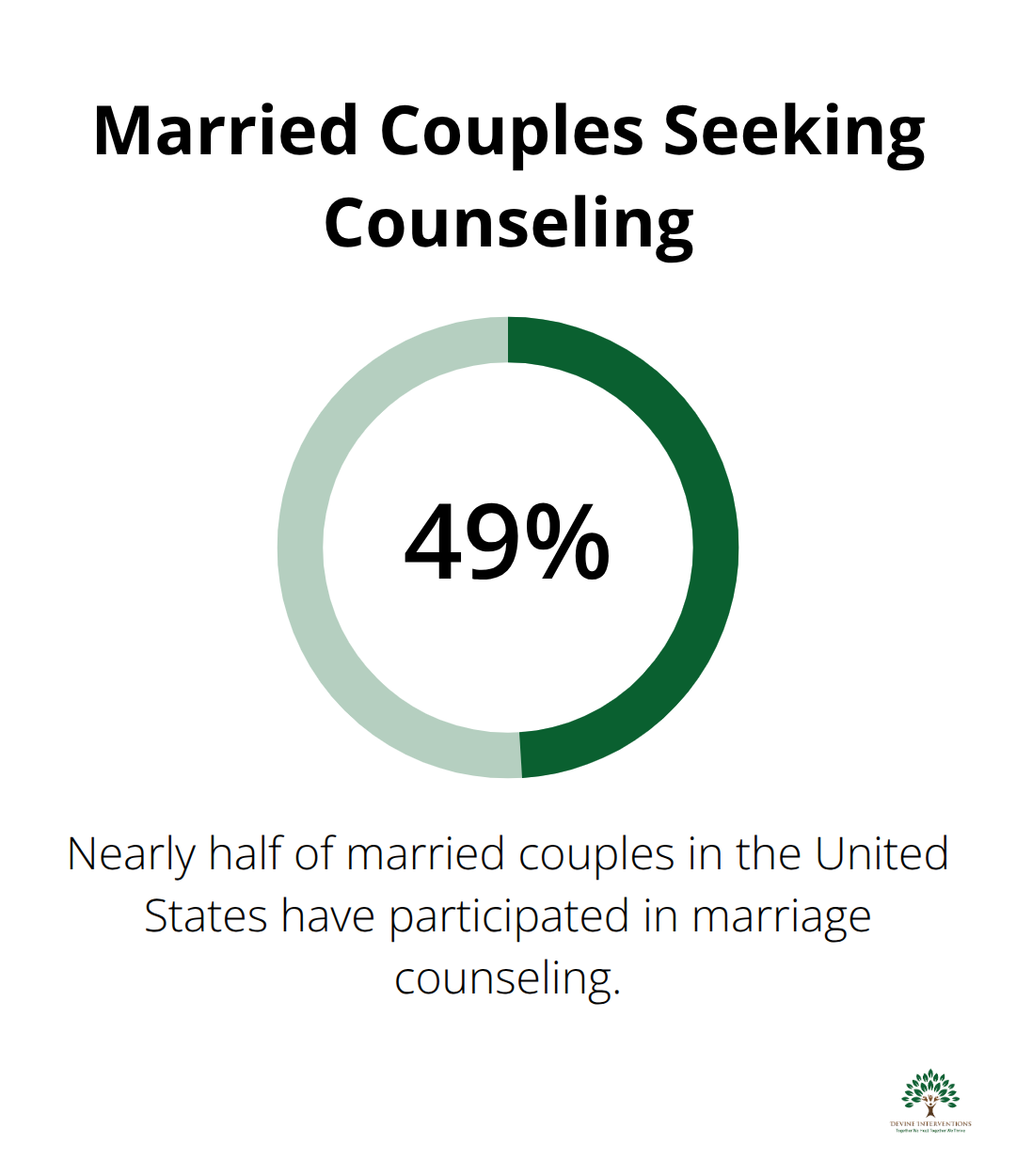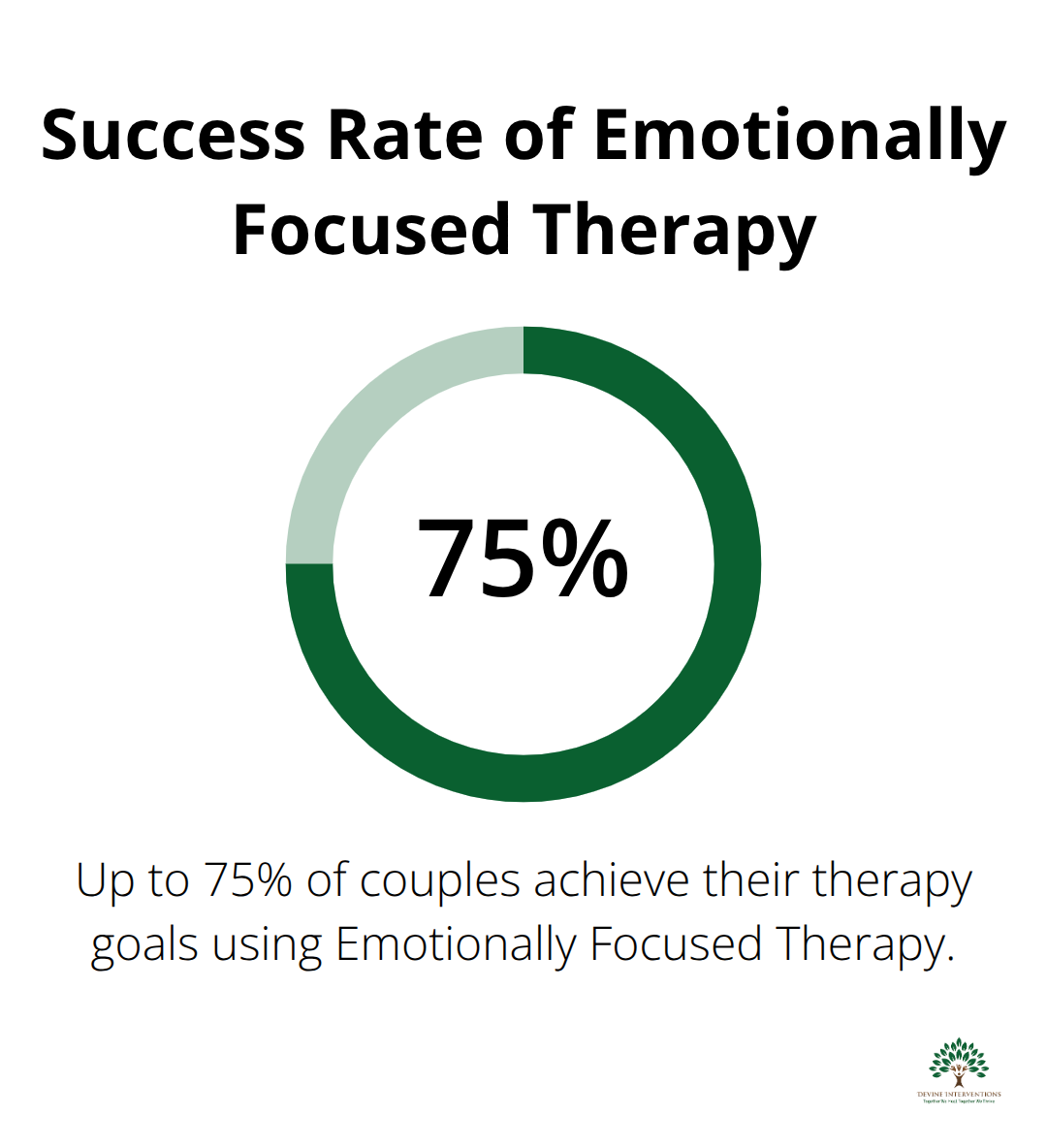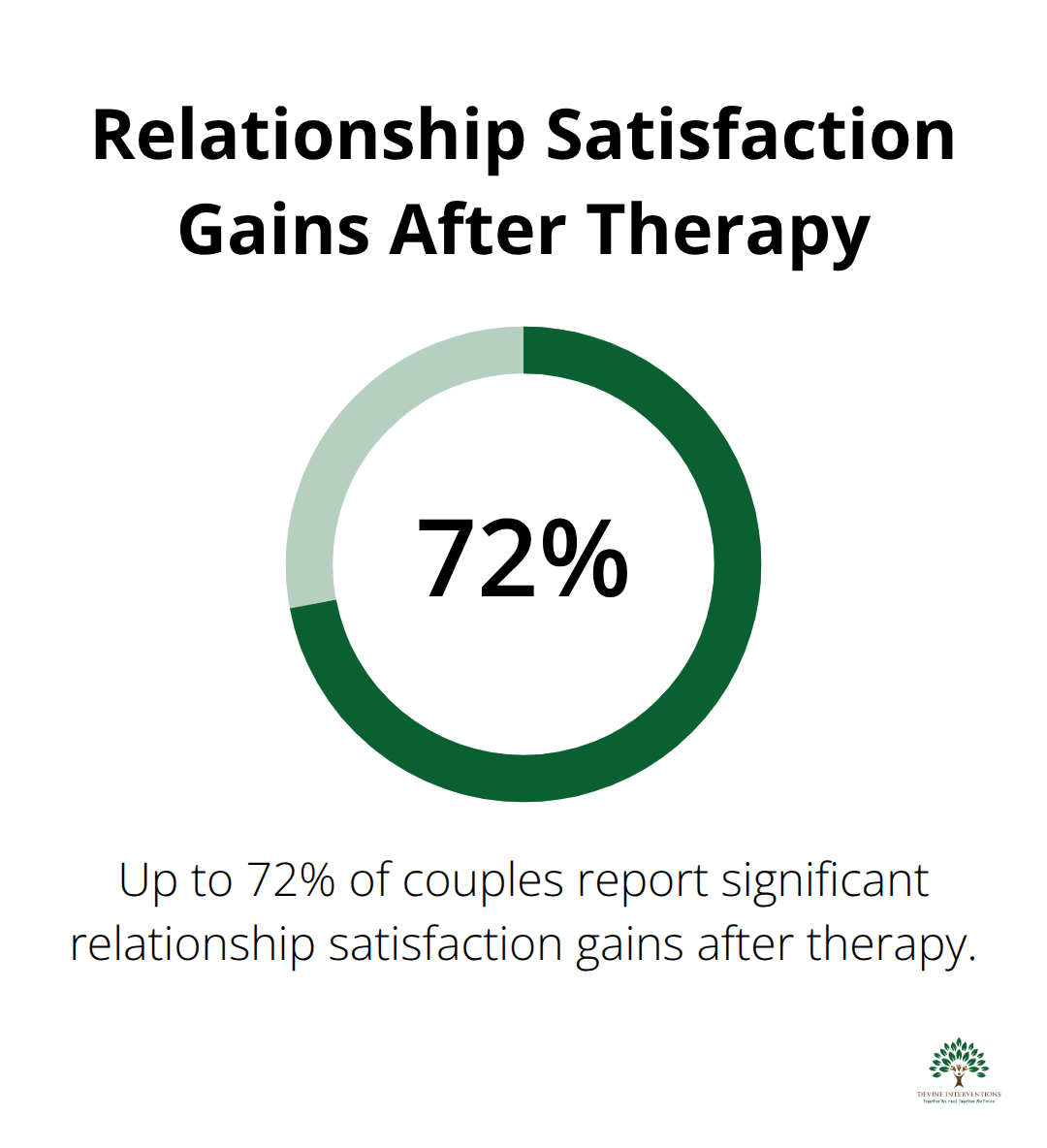Relationships face challenges that can feel overwhelming, but professional support offers a clear path forward. Many couples find that working with a therapist strengthens their bond and improves communication.
We at Devine Interventions understand that taking this step requires courage. These couples therapy tips will help you navigate the process and maximize the benefits of professional relationship support.
When Should You Consider Couples Therapy
Most couples wait an average of six years before they seek professional help, according to relationship expert Dr. John Gottman. This delay often makes problems harder to resolve and creates deeper emotional wounds. The truth is that relationships face significant challenges that require outside guidance to navigate successfully.
Communication Breakdown Warning Signs
When conversations consistently turn into arguments or you find yourselves avoiding difficult topics altogether, professional intervention becomes necessary. Communication problems are the leading reason couples seek marriage counseling. If you notice patterns of defensiveness, criticism, or emotional withdrawal during discussions, these behaviors signal that your relationship dynamics need professional attention. Partners who can’t express their needs without triggering conflict or who feel unheard despite repeated attempts to communicate benefit significantly from therapeutic support.
Emotional Distance and Recurring Conflicts
Emotional disconnection represents another clear indicator that professional help is warranted. When partners feel like roommates rather than romantic partners, or when physical and emotional intimacy has significantly declined, therapy can rebuild those bonds. Additionally, if you find yourselves having the same arguments repeatedly without resolution, this pattern indicates deeper underlying issues that require professional guidance. Nearly 49% of married couples in the United States have participated in marriage counseling, demonstrating widespread acceptance of therapy as a relationship tool.

Financial Stress and External Pressures
Financial disagreements create frequent tension among couples and drive many toward professional support. When money discussions consistently lead to conflict or when external stressors like work pressure strain your relationship, therapy provides tools to manage these challenges effectively. Couples who face major life transitions, parenting conflicts, or career changes often find that professional guidance helps them navigate these pressures together rather than letting them create division.
Overcoming Therapy Misconceptions
Many people wrongly believe that seeking couples therapy means their relationship is failing. In reality, couples who start therapy before serious problems develop often see better outcomes. The stigma around therapy prevents many couples from getting help when it could be most effective. Marriage and Family Therapists focus on changing negative interaction patterns rather than fixing individuals, making it a collaborative process that strengthens your relationship’s foundation.
Understanding these warning signs helps you recognize when professional support becomes beneficial, but knowing what to expect from the therapeutic process itself can ease any remaining concerns about taking this important step.
What Happens During Your First Sessions
Your first couples therapy session involves a comprehensive 60-90 minute assessment where the therapist gathers information about your relationship history, current challenges, and individual backgrounds. During this initial consultation, you’ll discuss your relationship timeline, major conflicts, communication patterns, and what brought you to therapy. The therapist asks specific questions about your family dynamics, past trauma, and current life stressors that impact your relationship. This thorough evaluation helps create an individualized treatment plan that addresses your specific needs and goals as a couple.
Clear Goals Shape Your Success
After the assessment, you’ll work collaboratively with your therapist to establish specific, measurable goals for your relationship. Research shows that couples who set clear, shared goals in therapy focus more effectively on positive changes like improved communication or increased intimacy. Your therapist helps you identify what success looks like for your relationship, whether that’s reduced conflict frequency, rebuilt trust after betrayal, or emotional reconnection. These goals get reviewed and adjusted regularly based on your progress (with most therapists recommending at least 12 sessions for meaningful progress). The average couple stays in therapy for about six months, attending sessions 2-4 times per month.
Evidence-Based Methods Drive Real Change
Emotionally Focused Therapy achieves therapy goals in 70-75% of couples by helping couples understand and change their negative interaction patterns. The Gottman Method combines conflict resolution strategies with techniques to improve the friendship foundation of your relationship. Your therapist teaches you practical communication skills, active listening techniques, and conflict management tools that you can practice between sessions. These proven approaches focus on changing how you interact rather than trying to fix individual personality traits (making the process feel collaborative rather than judgmental).

Homework Assignments Accelerate Progress
Therapists provide structured exercises and take-home assignments that reinforce skills learned during sessions. These practical tools allow couples to practice new communication and conflict-resolution skills outside of therapy appointments. Guided communication exercises, active listening practice, and structured problem-solving activities help you apply therapeutic insights to real-life situations. Consistency of practice and follow-through on these assignments significantly affects the success of couples counseling.
The therapeutic process requires active participation from both partners, but understanding how to maximize your investment in therapy can transform these sessions from helpful conversations into powerful catalysts for lasting relationship change.
How Can You Maximize Your Therapy Investment
Success in couples therapy depends entirely on your commitment outside the session room. Couples who actively engage between appointments experience notable improvements, with studies showing 60% to 72% of couples reporting significant relationship satisfaction gains after treatment. Start each session with specific examples from your week – what worked, what triggered conflict, and which communication tools you practiced. Prepare three concrete topics you want to address rather than hope inspiration strikes during your 50-minute window. Write down insights immediately after sessions while they remain fresh, and review these notes before your next appointment.
Practice New Skills Daily Between Sessions
Your relationship changes happen in everyday moments, not just during therapy sessions. Practice the specific phrases your therapist teaches you – replace blame language like “you always” with ownership statements like “I feel when this happens.” Set phone reminders to check in with your partner twice daily with new communication techniques. When conflicts arise, pause and apply the ground rules you’ve learned: one person speaks while the other listens without interruption, then switch roles.
Schedule 20-minute weekly relationship meetings to practice these skills in a low-pressure environment. Research shows couples who maintain these structured practices between sessions benefit from therapy’s high success rate, with 60% to 72% of couples experiencing significant improvements in relationship satisfaction.

Treat Homework Assignments as Non-Negotiable
The most successful couples treat therapy homework assignments as non-negotiable commitments. Practice active listening exercises for 15 minutes daily and implement conflict resolution strategies the moment tension arises. Complete written exercises your therapist assigns, whether they involve gratitude lists or communication practice sheets. Track your daily interactions and note which therapeutic tools you used successfully.
Push Through Resistance When Progress Feels Slow
Therapy gets harder before it gets easier, and couples who push through initial discomfort see the most dramatic improvements. When your therapist challenges long-standing patterns or asks you to express vulnerability, lean into that discomfort rather than retreat. The most transformative breakthroughs happen when both partners commit to difficult conversations even when every instinct says to shut down or fight back.
Track your progress weekly by rating your relationship satisfaction and conflict frequency – this data proves that temporary discomfort leads to lasting change. Most couples experience their biggest breakthrough around session 8-10, precisely when many feel tempted to quit because the process feels too challenging. Clinics that invest in proper staff training demonstrate significantly higher client satisfaction rates and treatment outcomes.
Final Thoughts
Professional relationship support transforms partnerships through proven therapeutic techniques and structured communication improvements. Research demonstrates that 70-75% of couples report enhanced relationship satisfaction after therapy completion, with benefits that last up to two years post-treatment. These couples therapy tips provide the foundation for lasting change when both partners commit to the process.
Quality therapeutic care addresses root causes of relationship challenges rather than surface-level symptoms. When couples invest in professional support early, they develop conflict resolution skills, rebuild emotional intimacy, and create stronger partnership foundations. The therapeutic process requires patience and commitment, but couples who actively participate experience profound relationship transformations (with most seeing breakthrough moments around session 8-10).
We at Devine Interventions offer comprehensive couples therapy services through our evidence-based treatment approach. Our experienced therapists guide couples through structured goal-setting processes and provide practical tools for communication improvement. Ready to strengthen your relationship? Contact Devine Interventions today to schedule your comprehensive assessment and begin your journey toward improved communication and deeper connection.







